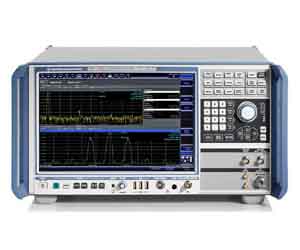Occasionally I get into one of my more “techie” moods, and I feel I have to share with you an application note or white paper written by an engineer from one of the three or four big test and measurement equipment manufacturers. They really know their stuff and I think it’s worth sharing even if you don’t intend to own any of their equipment. (And maybe you do!)
In an application note (1EF78) on the measurement of harmonics, Rohde and Schwarz’ Dr. Florian Ramian discusses the theory of harmonics, problems in measuring the non-linear components of a circuit, and the advantages of the R&S®FSW signal/spectrum analyzer’s high pass filter for harmonic measurements.
He explains the need to isolate the harmonics generated by the measurement instrument from the harmonics of the device under test (DUT). Typically a spectrum analyzer is the measuring instrument of choice because of its ability to simultaneously display both the actual signal, and the harmonics of the signal. He describes how the high pass filters of the FSW preclude the need for further RF attenuation to the signal to reduce harmonic distortion, thus keeping the noise floor low, and increasing the sensitivity of the measurements.
That’s all I’m going to say about it. Take a look at Dr. Ramian’s discussion yourself in the Rohde & Schwarz application note (in PDF format).
If you want to take a look at the features and specs of one of the FSW’s, here’s the FSW43 on Used-Line.com.

